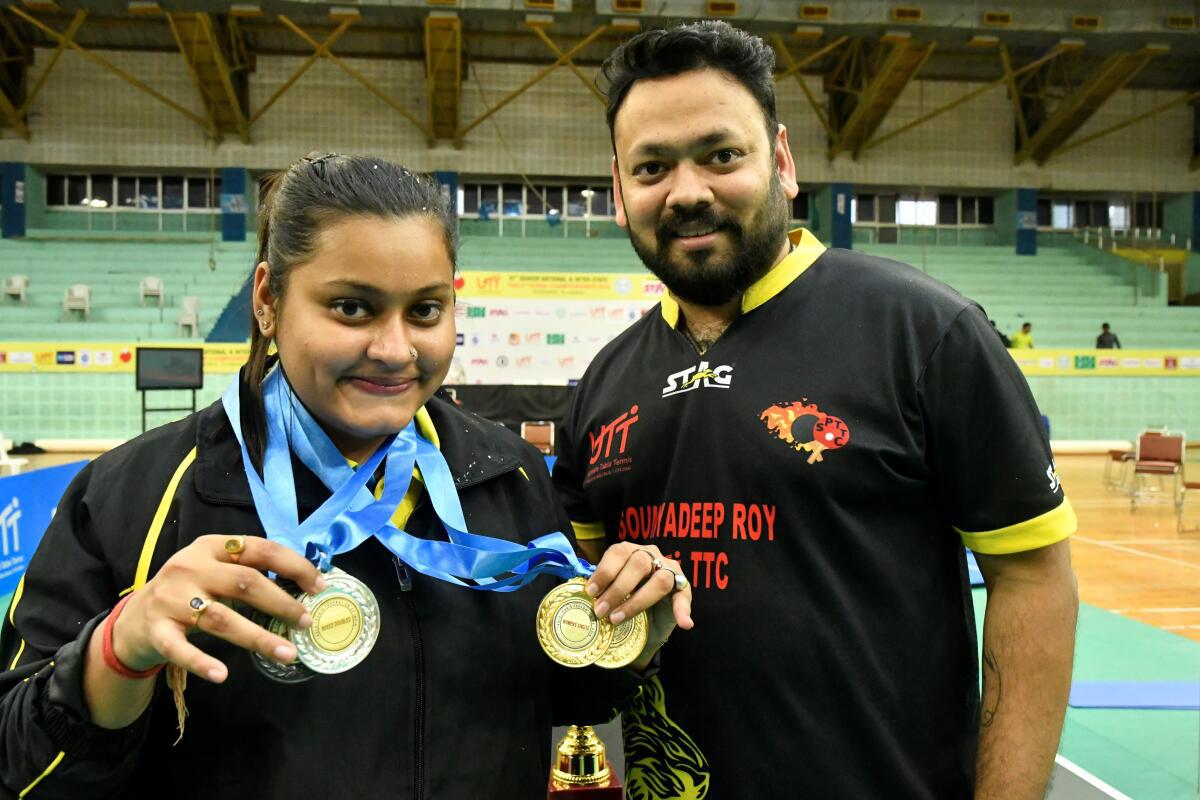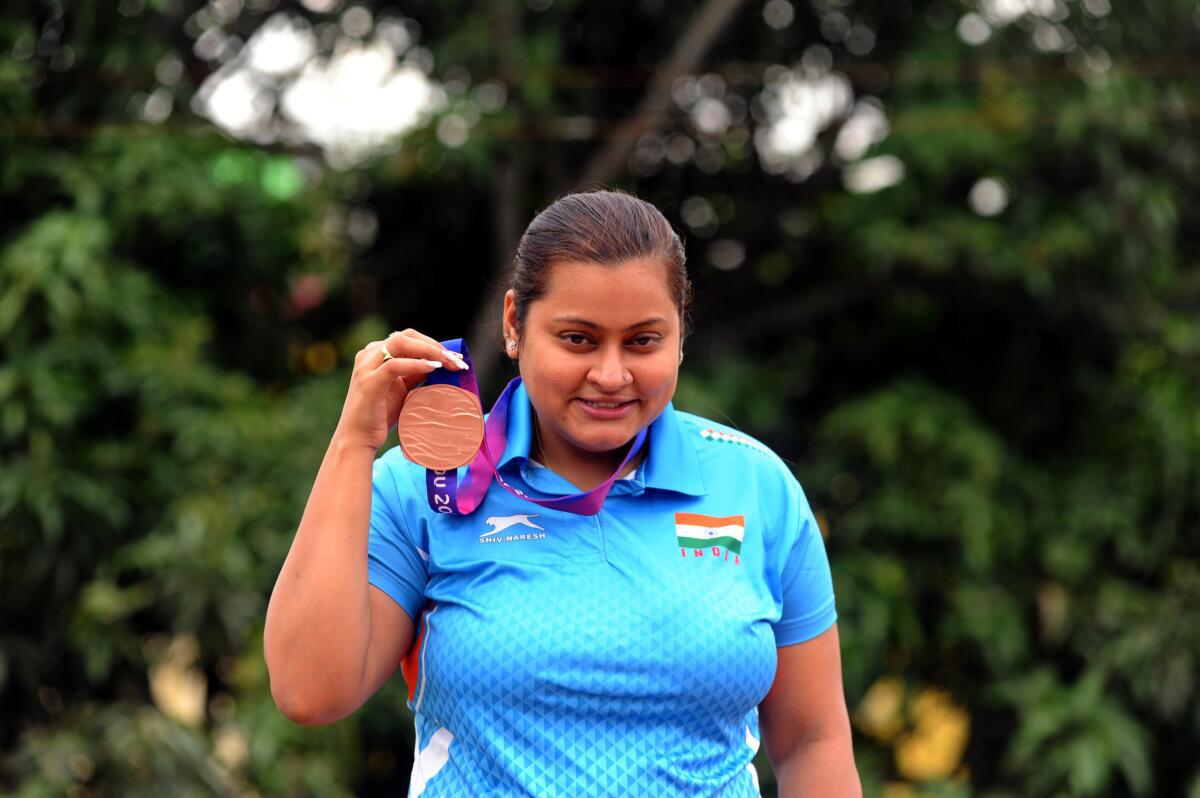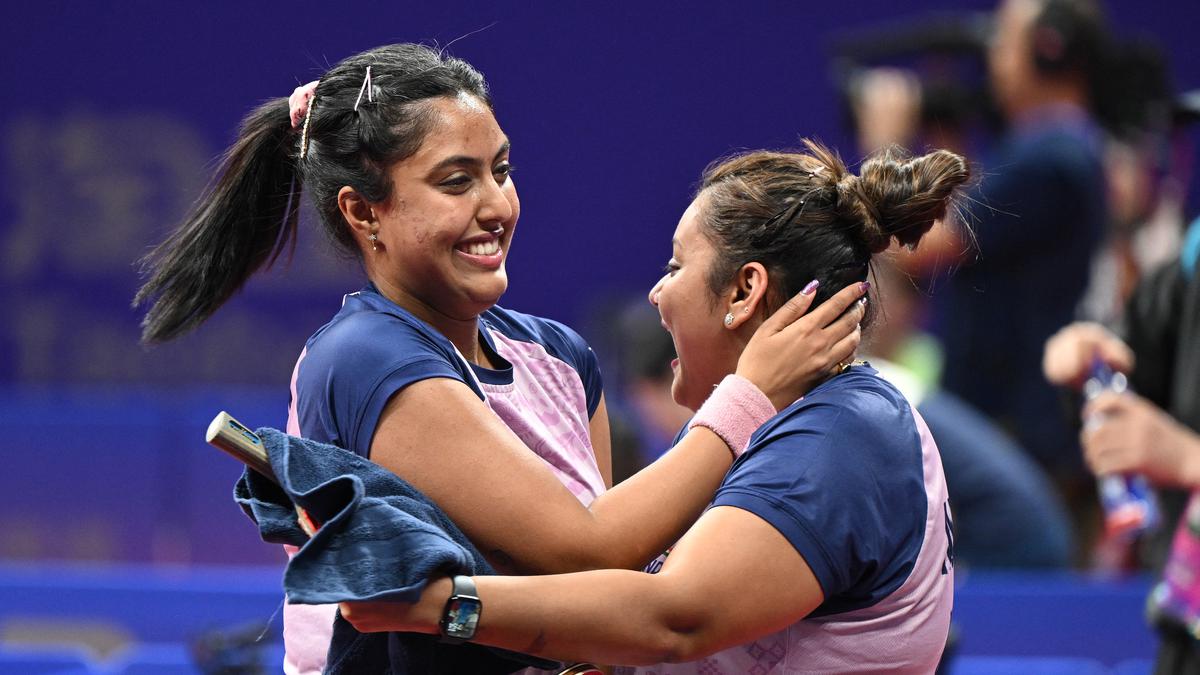Sutirtha-Ayhika, with identical surnames, similar backstories, put Naihati on TT’s world map
The name Madral would have remained tucked in obscurity had it not been for the extraordinary feat of two girls from this little township in Naihati. Childhood friends Sutirtha Mukherjee and Ayhika Mukherjee, who came together to win the first Asian Games table tennis medal in women’s doubles, have made the world sit up and take notice.
As Sutirtha and Ayhika look back at their respective journeys, one realises that the duo, with identical surnames, have similar stories of pain and struggle to relate.
Sutirtha, the older of the two, had to overcome social stereotypes and prejudices prevailing among people in the mofussil town, situated around 50 kilometers from Kolkata, when she started taking table tennis lessons as a seven-year-old. “We had to hear taunts from a lot of people here when my mother took me to Mihir kaku’s (uncle’s) academy. People here could not accept that I would be wearing shorts and playing with boys. My mother and father were very supportive and brushed away the spiteful remarks to see me prosper in the game,” Sutirtha reflected on the difficult initiation process.
“I had to cycle up and down many times a day to take her to the academy. Later on, when she started training at SAI (Eastern Centre, Kolkata) our routine was set based on the timings of local trains, as we travelled 50 km each way, almost every day throughout the year. When she started playing tournaments, the cost factor went up even further. There was no financial assistance of any kind, and we had to manage everything from the limited income of her father,” says Suthirtha’s mother, Neeta.
Sutirtha and Ayhika owe their rise to the efforts of Mihir Ghosh, who, as a former player, started a coaching school in one of the clubs in Naihati to tap into the local talents. “Mihir sir was impressed with my game and told me that you have the talent to reach the professional level,” Sutirtha said, reminiscing of the encouragement she received from her coach after her mother decided to enroll her.
“Since the early days, I have been winning tournaments regularly at the state level. I became the sub-junior (2009) and later the junior national champion (2012) while training under Mihir sir. After that, I was picked up by Soumyadeep Roy and Poulomi Ghatak to train at an advanced level when they launched their academy (Dhanuka Dhunseri Soumyadeep Poulomi TT Academy),” Sutirtha, who became the senior national champion in 2017 and 2019, says.
“Poulami di (the Bengali way of addressing an elder sister) is my idol, and when she and Soumyadeep da (Bengali for elder brother) asked me to train at their academy, I agreed. They are helping me get enough sponsorship to fund my trips abroad,” says Sutirtha about the former national champion couple, who are now running one of the best-equipped academies in the country.

A winning combo: Sutirtha Mukherjee poses with her medals from the 81st senior national and interstate championship in Hyderabad on February 2, 2020. Also seen in the picture, is her coach Soumyadeep Roy.
| Photo Credit:
G. Ramakrishna/The Hindu
A winning combo: Sutirtha Mukherjee poses with her medals from the 81st senior national and interstate championship in Hyderabad on February 2, 2020. Also seen in the picture, is her coach Soumyadeep Roy.
| Photo Credit:
G. Ramakrishna/The Hindu
“Though Ayhika started a bit late, being a little junior in age, we developed a good friendship at the junior level as trainees of the same academy. We also played the doubles for fun but did not continue at the senior stage. Then, sometime in 2022, we thought of pairing up once again when the two of us started training together at the DDSP Academy. The decision worked as we became the National Games champion (for Bengal) in doubles. We are really bonding well as partners, and our communication seems just right. We next went on to win a World Tour title (WTT Contender in Tunis) earlier this year, and now we have the Asian Games bronze,” Sutirtha said.
The Asian Games medal was like a dream come true. Table tennis at the Asian Games is of the standard of the Olympics, as all the top players in the world play here. Beating the world champion Chinese team, and that too in China, was something unimaginable. The support of the new Table Tennis Federation of India secretary general, Kamlesh Mehta, is really appreciable. As players, we are getting a lot of support from the Federation and Mehta sir, who is extra careful about the needs of the players,” Sutirtha says while hoping to make their partnership excel in the upcoming WTT Contender event in Muscat.
“My parents sacrificed a lot to see me prosper in table tennis. My father left his job with the BSF to devote time to my training and travelling during the tournaments. I have reached this place because they sought to dedicate their best for my betterment as a player,” says Ayhika about the great pains her parents took to give her the best coaching facilities.
“Mihir sir is one of the most hardworking and dedicated coaches I have ever seen. I owe a lot to him for my growth as a player. And the DDSP academy helped in fine-tuning my game both technically and tactically. The way Soumyadeep da and Poulomi di plan out the training programme is great, as it really helps in getting the best out of us,” she added.
The belief system
“We never thought of beating players from countries like China, Japan, and Korea, but once I joined the DDSP academy, our coaches Soumyadeep and Poulomi inspired us to dream anew and elevated our self-belief. As we started believing in our abilities, the level of our game rose significantly,” Sutirtha says, analysing the transformation in their game.
“Even our worthy opponents are now wary of us. And we could prove that in Hangzhou when we beat the world champions—Chen Meng and Wang Yidi—in their very backyard. A big partisan crowd of around 15,000 was constantly rooting for the home players, and we just closed ourselves off from the noise to turn the tables on them,” she continued.

Reigning in a TT revolution: Sutirtha Mukherjee poses with her Hangzhou 2022 women’s doubles bronze medal outside her residence.
| Photo Credit:
Debasish Bhaduri/The Hindu
Reigning in a TT revolution: Sutirtha Mukherjee poses with her Hangzhou 2022 women’s doubles bronze medal outside her residence.
| Photo Credit:
Debasish Bhaduri/The Hindu
“Table tennis is a sport that is evolving every six months. One has to be alert to know those developments and pass them on to the players. Sutirtha has been training for eight years under me, and her progress is remarkable. I saw the potential in them as a pair after they regained their doubles partnership. I made them believe that they could beat anyone in the world. That happened in the WTT Contenders in Tunis (June 2023), where they beat some of the best women’s teams to win the title,” says their coach, Soumyadeep.
“Their game is a fine mixture of aggression and trickery, and I have put them through different game situations in a multi-ball training system. But above all, it was to impart that belief system that I can beat anyone on a given day, which is something that I have been focusing on as a coach. This is to get their combination working, as the two have differing playing styles and use different rubbers on their bats. The proper execution of the game plan comes from a lot of training and a strong belief system that helps them raise their game at the right time,” Soumyadeep, who is an ardent admirer of badminton legend Pullela Gopichand’s training methods, adds about his trainees.
“We are doing well, but I believe our best is yet to come. Maybe we could have gone further (in the Asian Games) after we had won against the Chinese pair (Meng and Wang), who are the world champions. Chen Meng is also the Olympic champion. The North Korean pair in the semifinals was definitely beatable, but on that day, they played really well.
ALSO READ: Asian Games 2023 archery review: India hits the bullseye in Hangzhou
We are happy with our progress, as we have really worked hard for it. Despite having completely different game styles, we complement each other very well as a team. We can read our minds well, and that translates to a proper understanding during a match. When we play as a team, I try to create the favourite ball (preferable returns to hit the winner) for her, and she does the same thing for me. That makes things easier for us. We had played many tournaments as a team at the junior stage but were playing with different partners in the senior stage before our personal coach, Soumyadeep sir, asked us to team up and practice with a proper plan,” Ayhika said about her partnership with Sutirtha. They are currently ranked an impressive 15th in the world, as of writing.
“I can say that they have reached this level of excellence because they are dedicated and hardworking. They hardly missed any training sessions as kids, and they continue to remain committed to training in the same way despite all the success. I hope their achievements are recognised with Arjuna Awards,” says Mihir, in a way summing up the success story of two of his best cadets.



